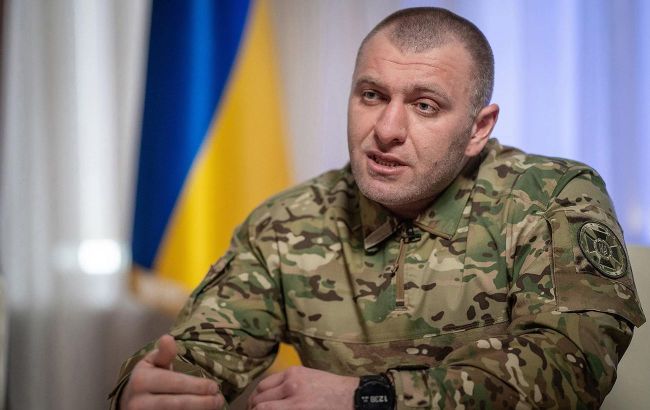Ukraine's Security Service head warns Russia about 'surprises' in 2024
 Head of the Security Service of Ukraine Vasyl Maliuk (facebook.com/SecurSerUkraine)
Head of the Security Service of Ukraine Vasyl Maliuk (facebook.com/SecurSerUkraine)
Ukrainian special forces are planning to intensify intelligence operations and carry out sabotage strikes against the invaders' targets in the temporarily occupied regions of Ukraine and in Russia itself next year, according to the head of the Security Service of Ukraine Vasyl Maliuk.
"We cannot disclose our plans. They should remain a shocker for the enemy. We prepare surprises. The occupiers must understand that it will not be possible to hide. We will find the enemy everywhere," Maliuk says.
He evaded specifics but hinted that logistics and military assets in the temporarily occupied territory of Ukraine will remain in the spotlight.
“We are always looking for new solutions. So, "cotton" (explosions ironically - Ed.) will continue to burn,” the SSU chief jokes.
As the fighting on the front line has not been progressing as fast as we would like, the SSU's exploits not only boost the morale of Ukrainians but also damage Russia's combat capabilities.
"The SSU carries out targeted point strikes. We stab the enemy with a needle right in the heart. Each of our special operations pursues a specific goal and gives its result. All this in a complex complicates the capabilities of the Russian Federation for waging war and brings our victory closer," emphasizes Maliuk.
According to him, a lot of attention will be paid to Crimea and the Black Sea, based on the operations of Ukrainian soldiers this year.
Currently, the main project of the SSU is the Sea Baby drone, called maliuk in Ukrainian, which means "little guy". The drone carries about 850 kilograms of explosives and can operate in stormy conditions, making it difficult to detect.
"With the help of those little guys we are gradually pushing the Black Sea Fleet of the Russian Federation out of Crimea," Maliuk says.
In July, it was used to attack the Kerch Bridge, which connects the occupied Crimea with mainland Russia, as well as to strike the Russians' ships.
"It is a legitimate target for us, according to international law and the rules of war. Ukrainian law also allows us to attack this object. And we have to destroy the logistics of our enemy," adds the SSU chief.
Maliuk notes that Ukraine carefully considers its targets before launching a strike - trying to follow the rules of war, unlike Russia, which has fired missiles, artillery, and drones at both military and civilian targets.
"When planning and preparing its special operations, the SSU carefully selects its targets. We work on military facilities or on those that the enemy uses to carry out their military tasks. We act fully by the norms of international law," he emphasizes.
The SSU conducts most of its operations in the temporarily occupied territories of Ukraine - Donbas, Crimea, and the Black Sea.
"This is our land and we will use all possible methods to free it from the occupiers," Maliuk says.
At the same time, he said, when it comes to planning operations in Russia, the SSU focuses only on targets that are used as logistical corridors for weapons supply, such as a railroad tunnel in Siberia.
"All SSU operations you hear about are exclusively our work and our unique technical development. These operations became possible, in particular, because we develop and implement our technical solutions," adds Maliuk.
SSU operations in Russia
In late November, RBC-Ukraine's sources reported an explosion on the Baikal-Amur highway in Buriatia. It was a successful SSU operation that paralyzed the only major railroad route between Russia and China. It is used, in particular, for military supplies.
It was about the explosion in the Severomaisky tunnel. According to the source, four explosive devices went off in the tunnel while a freight train was traveling. At first, the Russian Federation said that a fire had allegedly started in the tunnel due to a "short circuit in the cable network."
Later, the Russians began to claim that the explosion was allegedly caused by "sabotage." A criminal case was opened in Russia under the article "terrorist attack."
The next day, the Security Service of Ukraine organized another explosion on an important strategic Russian railroad. Another train was blown up in Buriatia.

